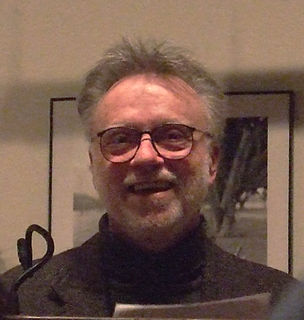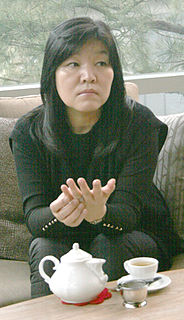A Quote by John Crowley
She had always lived her best life in dreams. She knew no greater pleasure than that moment of passage into the other place, when her limbs grew warm and heavy and the sparkling darkness behind her lids became ordered and doors opened; when conscious thought grew owl's wings and talons and became other than conscious.
Related Quotes
In a way, her strangeness, her naiveté, her craving for the other half of her equation was the consequence of an idle imagination. Had she paints, or clay, or knew the discipline of the dance, or strings, had she anything to engage her tremendous curiosity and her gift for metaphor, she might have exchanged the restlessness and preoccupation with whim for an activity that provided her with all she yearned for. And like an artist with no art form, she became dangerous.
She followed the pleasure where it led. She had no weight, no name, no thoughts, no history. Then came a burst of phosphorescence, as though a firework had discharged behind her eyes, and it was over. She felt quiet and warm. For the first conscious moment of her life, her mind was free from wonder, free from worry, free from work or puzzlement. Then, from the middle of that marvelous furred stillness, a thought took shape, took hold, took over. I shall have to do this again.
She expected the pain, when it came. But she gasped at its sharpness; it was not like any pain she had felt before. He kissed her and slowed and would have stopped. But she laughed, and said that this one time she would consent to hurt, and bleed, at his touch. He smiled into her neck and kissed her again and she moved with him through the pain. The pain became a warmth that grew. Grew, and stopped her breath. And took her breath and her pain and her mind away from her body, so that there was nothing but her body and his body and the light and fire they made together.
Well, here he was. They could save each other, the way the poets promised lovers should. He was mystery, he was darkness, he was all she had dreamed of. And if she would only free him he would service her - oh yes - until her pleasure reached that threshold that, like all thresholds, was a place where the strong grew stronger, and the weak perished. Pleasure was pain there, and vice versa. And he knew it well enough to call it home.
Yet losing him seemed unbearable. He was the one she loved, the one she would always love, and as he leaned in to kiss her, she gave herself over to him. While he held her close, she ran her hands over his shoulders and back, feeling the strength in his arms. She knew he’d wanted more in their relationship than she’d been willing to offer, but here and now, she suddenly knew she had no other choice. There was only this moment, and it was theirs.
...I have so many dreams of my own, and I remember things from my childhood, from when I was a girl and a young woman, and I haven't forgotten a thing. So why did we think of Mom as a mom from the very beginning? She didn't have the opportunity to pursue her dreams, and all by herself, faced everything the era dealt her, poverty and sadness, and she couldn't do anything about her very bad lot in life other than suffer through it and get beyond it and live her life to the very best of her ability, giving her body and her heart to it completely. Why did I never give a thought to Mom's dreams?
For she was a child, throwing bread to the ducks, between her parents who stood by the lake, holding her life in her arms which, as she neared them, grew larger and larger in her arms, until it became a whole life, a complete life, which she put down by them and said, "This is what I have made of it! This!" And what had she made of it? What, indeed?
At that moment a very good thing was happening to her. Four good things had happened to her, in fact, since she came to Misselthwaite Manor. She had felt as if she had understood a robin and that he had understood her; she had run in the wind until her blood had grown warm; she had been healthily hungry for the first time in her life; and she had found out what it was to be sorry for someone.
She became politically conscious thanks to Studs Terkel and the radio. She started reading all the books we brought home from college and was a great fan of Noam Chomsky. She was a real lefty and yet was not able to meet her dream of becoming an artist. She got drafted into motherhood big time - seven kids - and that wasn't the life that she had planned. So she opened the path so that I could be the artist that she wanted to be.
It was the peculiar artifice of Habit not to suffer her power to be felt at first. Those whom she led, she had the address of appearing only to attend, but was continually doubling her chains upon her companions; which were so slender in themselves, and so silently fastened, that while the attention was engaged by other objects, they were not easily perceived. Each link grew tighter as it had been longer worn; and when by continual additions they became so heavy as to be felt, they were very frequently too strong to be broken.
Occasionally, on screen, Barbara [Stanwyck] had a wary, watchful quality about her that I've noticed in other people who had bad childhoods; they tend to keep an eye on life because they don't think it can be trusted. After her mother was killed by a streetcar, she had been raised in Brooklyn by her sisters, and from things she said, I believe she had been abused as a child. She had lived an entirely different life than mine, that's for sure, which is one reason I found her so fascinating. I think her early life was one reason she had such authenticity as an actress, and as a person.
Her life was beginning to make sense again, although she couldn’t say she was enjoying it. But her mind was clear, and her heart was not constantly as heavy. Only when she thought about him. But she knew that in time, she’d survive it. She had done it before and would again. Eventually the heart repairs.
She thought in would be awkward for both to be brought into conscious collision; and fancied that, from her being on a low seat at first, and now standing behind her father, he had overlooked her in his haste. As if he did not feel the consciousness of her presence all over, though his eyes had never rested on her!
From the first time he'd met her, he'd sensed an air of contradiction about her. She was very much a woman, but still retained a waiflike quality. She could be brash, and at times deliberately suggestive, yet she was painfully shy. She was incredibly easy to get along with, yet she had few friends. She was a talented artist in her own right, but so self-conscious about her work that she rarely completed a piece and preferred to work with other people's art and ideas.
This was exactly what the girl had most dreaded all her life and had scrupulously avoided until now: lovemaking without emotion or love. She knew that she had crossed the forbidden boundary, but she proceeded across it without objections and as a full participant; only somewhere, far off in a corner of her consciousness, did she feel horror at the thought that she had never known such pleasure, never so much pleasure as at this moment--beyond that boundary.





































